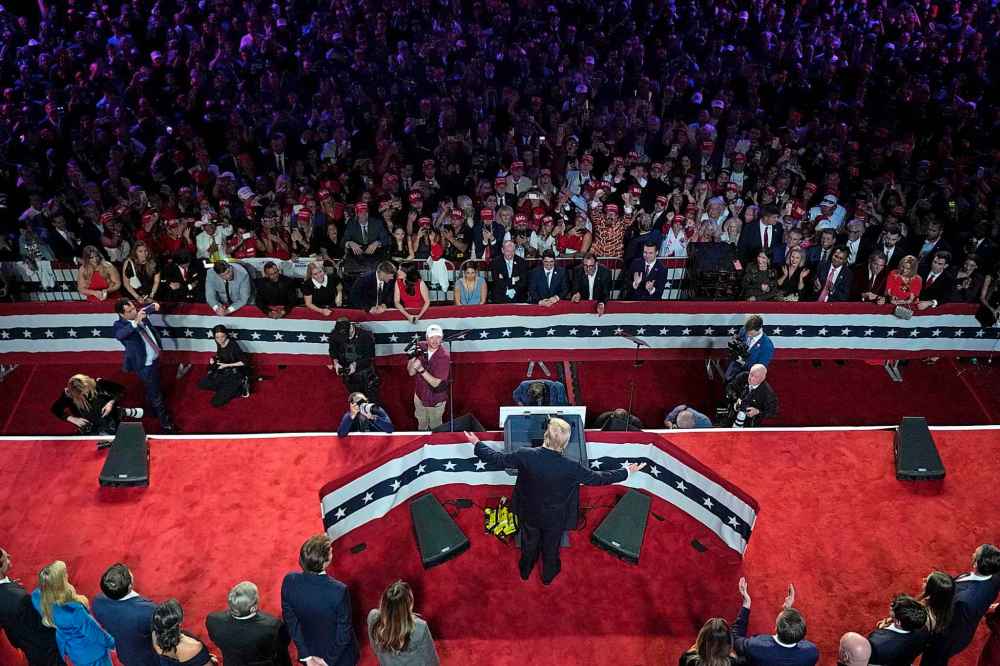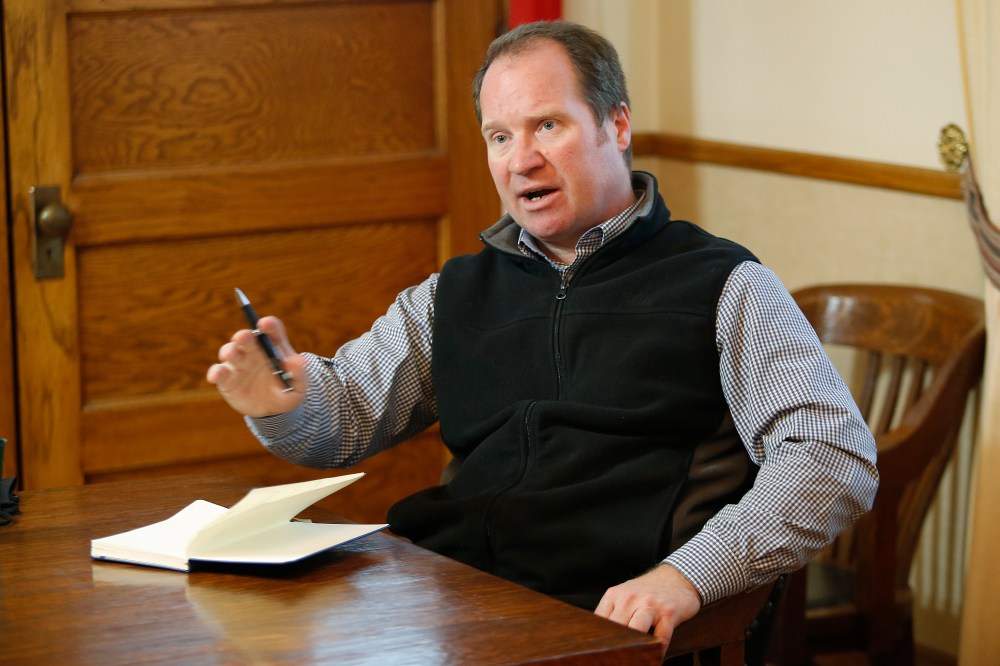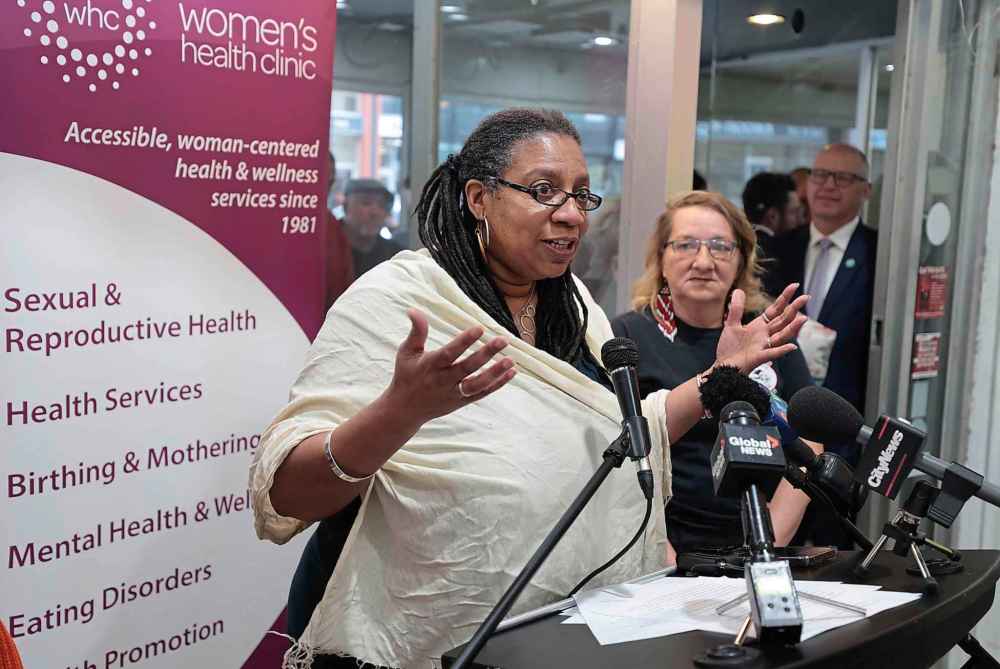Donald Trump’s victory in the U.S. presidential election could bring sweeping changes to Manitoba as the provincial immigration sector braces for an influx of newcomers and the business community remains leery of trade impacts.
Trump, who ran on a campaign that included threats of mass deportation and stiff tariffs, will become the country’s 47th president after routing Democratic candidate and Vice-President Kamala Harris overnight Tuesday.
While votes were still being counted Wednesday afternoon, the verdict was already cemented, with Trump earning well above 270 electoral college votes — the minimum required to win the presidency.

“The election was a very poor day for pollsters in general, where they discounted across the board the level of support for Trump,” said Sean MacDonald, a University of Manitoba business professor with a background in political studies.
“Hostility toward the Biden administration created an attitude of change for the sake of change.”
Manitobans are now looking to the southern border, which could be one of the first areas in the province to witness the effects after Trump takes office, MacDonald said.
The town of Emerson, near the U.S.-Canada border, experienced a crush of asylum seekers after Trump first won office in 2016. The following year, Manitoba RCMP intercepted 1,018 people attempting to cross.
“It’s hard to say whether we will see a big influx or if potential migrants in the U.S. may wait it out to see how things go,” RM of Emerson-Franklin Reeve Dave Carlson said by phone.
“The last thing we want is a repeat of 2017. It was kind of a scary time and it also stretched our emergency services — not to the breaking point — but it had us really running.”
Attempted border crossings have turned fatal numerous times in recent years, with people unaware of the treacherous climate and terrain surrounding the border community, he said.
Carlson noted the Canadian government has since changed how people can claim asylum. Under the new policy, implemented last March, asylum seekers without U.S. or Canadian citizenship who are caught within 14 days of crossing the border are sent back.
The reeve said he has not been briefed by police or border agents on what to expect.
“This is worrying for exporters in Manitoba.”–Prof. Sean MacDonald
Reached by the Free Press, Manitoba RCMP declined to comment on what, if anything, is being done to prepare for a possible influx — deferring comment to the police force’s national headquarters in Ottawa, where a spokesperson said it was not possible to respond Wednesday.
The Canadian Border Services Agency said it will continue to closely monitor trade and travel at the border.
“The agency works in an operating environment that changes on a daily basis and we are ready to respond and adapt as needed,” spokesperson Luke Reimer said in an email.
Winnipeg immigration lawyer Alastair Clarke said his office has already begun fielding calls from potential clients south of the border.
“My first thought was that we are going to need to hire more people,” he said, describing the moment he learned Trump won the election.
Clarke said his office engaged with “hundreds, possibly thousands” of migrants after Trump last took office, including refugee claimants, skilled workers and international students.
Some American citizens also reached out to inquire about coming to Canada, citing fears of a potential civil war and a feeling the incoming administration did not represent their values, he said.
“We are going to have to see which policies are implemented, which of (Trump’s) campaign promises actually lead to changes in legislation or executive orders. At this point, I would caution people not to make any rash decisions,” the lawyer said.
MacDonald believes Trump won over voters by tapping into frustrations over their economic situations.

The president-elect previously vowed to introduce a universal 10 per cent tariff on all American imports and a 60 per cent tariff on Chinese-made products.
“This is worrying for exporters in Manitoba,” MacDonald said. “You don’t know all the time whether Trump means what he says, but assuming he does, it’s going to be much harder to sell to American markets.”
Roughly 76 per cent of Manitoba’s exports ship to the United States, its largest trading partner.
In anticipation of the presidential election and the expiration of the North American free trade deal in 2026, Premier Wab Kinew led a Manitoba delegation of business, labour and industry representatives on a mission to Washington, D.C., in April.
Provincial trade adviser and former premier Gary Doer, who was Canada’s ambassador to the U.S. from 2009 to 2016, joined Kinew on the trip.
“He’s (Kinew) made really good contacts already there as our premier and he made some very articulate speeches as part of the trade delegation,” Doer said, speaking at a Winnipeg Chamber of Commerce event Wednesday.
Asked about the prospect of tariffs, Doer said Trump’s proposal is “good politics, but not good economics” because the taxes will also affect inflation in the U.S.
Speaking to reporters after question period at the Manitoba Legislature, the premier dismissed concerns over potential tariffs and said his government is prepared for a Trump presidency.
“We’re going to work with the incoming administration in Washington, D.C., to ensure we can have a good economy in Manitoba,” he said. “An American audience is very hungry for critical minerals and is very, very concerned about issues like energy security, national security, Arctic security and economic security.”

MIKAELA MACKENZIE / FREE PRESS
Gary Doer, the former Manitoba premier and ambassador to the U.S., spoke to more than 250 people at a Winnipeg Chamber of Commerce event Wednesday.
Kinew described Manitoba as “the Costco of critical minerals” with higher environmental, labour and human rights standards than most places in the world.
If tariffs are implemented, the impacts would be significant on Manitoba agriculture, manufacturing, mining and pharmaceutical industries, said Manitoba Chambers of Commerce president Chuck Davidson.
“All that’s going to do is increase costs,” Davidson said, adding both sides of the border would suffer.
The United States shipped $12 billion worth of goods into Manitoba within the first half of 2024, far more than the province sent to its southern neighbour (around $9.4 billion).
Normally, if one country places tariffs, the other reciprocates, Davidson said. He believes a permanent Manitoba representative in Washington is “absolutely critical.”
Ryan Kuffner, president of Economic Development Winnipeg, said Canada must highlight its importance in the security of food, energy and defence supply chains to America.
“We need to make sure that we frame the importance of our relationship (with the U.S.) in the areas the U.S. cares about.”
Some companies invest in Manitoba because of its proximity to the United States. If tariffs are placed, they might think twice before locating in the province, Kuffner said.
Pork producers have already clocked an increase in American protectionism. Recent legislation changes have made it harder for Manitobans to sell pigs down south, said Cam Dahl, general manager of Manitoba Pork.

Manitoba exports about three million live pigs to the United States annually; when combined with pork shipments, the U.S. is Manitoba’s biggest pork export market.
MacDonald said the prospect of tariffs could present an opportunity for provincial industries to pursue trade relationships elsewhere in the global market.
Kuffner agreed Manitoba companies may increasingly look elsewhere for trade partnerships, but they could be in “wait and see mode” until action happens at the White House.
MacDonald said political leaders of all stripes have been closely watching Trump’s journey to the presidency.
The election could have implications for future campaigns in Canada, including next year’s federal election when Pierre Poilievre and the Conservative party hope to defeat Prime Minister Justin Trudeau and the long-incumbent Liberals, he said.
Members of marginalized social groups, including women and the LGBTQ2S+ community have also kept tabs on the presidential campaign — with some fearing it could open the door to attacks against them.
Medical services, including abortions and gender-affirming surgery, came under fire during the election.
Kemlin Nembhard, executive director of the Women’s Health Clinic, said such issues may serve as a “bellwether” of what’s to come in Canada.
“We would be naive to think the rhetoric in the U.S. doesn’t have an impact on our political discourse in Canada,” she said.

MacDonald agreed it is possible Manitobans will see shifts in political discourse and cultural sentiments as the Trump administration settles in.
Both Kinew and interim Progressive Conservative leader Wayne Ewasko extended congratulations to Trump after his victory.
“While we may fly different flags, our shared commitment to democracy unites us and I look forward to continued collaboration and partnerships with our American neighbours for the betterment of all Manitobans,” Ewasko said in a statement.
— with files from Aaron Epp, Gabrielle Piché and Carol Sanders
tyler.searle@freepress.mb.ca

Tyler Searle
Reporter
Tyler Searle is a multimedia producer who writes for the Free Press‘s city desk. A graduate of Red River College Polytechnic’s creative communications program, he wrote for the Stonewall Teulon Tribune, Selkirk Record and Express Weekly News before joining the paper in 2022. Read more about Tyler.
Every piece of reporting Tyler produces is reviewed by an editing team before it is posted online or published in print — part of the Free Press‘s tradition, since 1872, of producing reliable independent journalism. Read more about Free Press’s history and mandate, and learn how our newsroom operates.
Our newsroom depends on a growing audience of readers to power our journalism. If you are not a paid reader, please consider becoming a subscriber.
Our newsroom depends on its audience of readers to power our journalism. Thank you for your support.